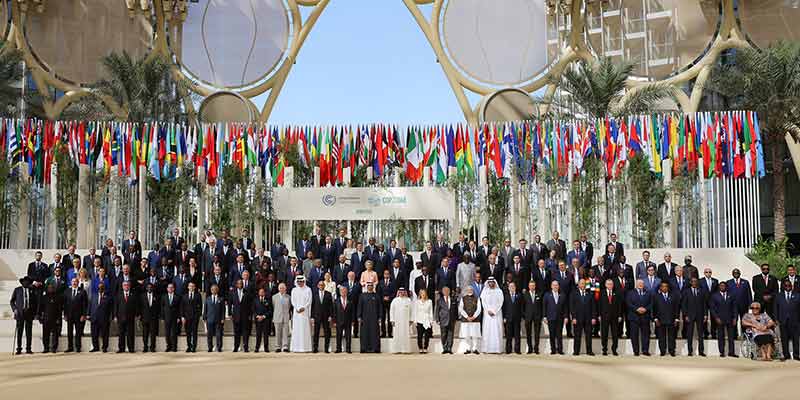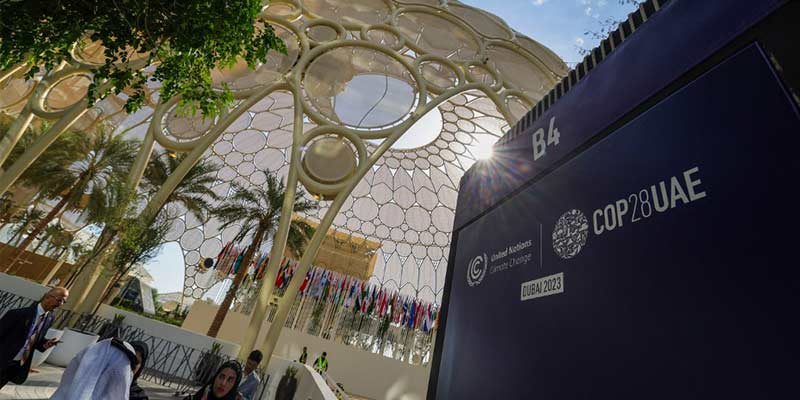- World
- Dec 14
COP28 deal agrees to ‘transition away’ from fossil fuels
• The United Nations Climate Change Conference (COP28) in Dubai closed on December 13 with an agreement that signals the “beginning of the end” of the fossil fuel era.
• Representatives from nearly 200 countries approved a roadmap for “transitioning away” from fossil fuels in an attempt to reach global net zero emissions by 2050. However, the deal stopped short of a long-demanded call for a “phase out” of oil, coal and gas.
• COP28 was scheduled to close on December 12. But intense overnight negotiations on whether the outcome would include a call to “phase down” or “phase out” planet heating fossil fuels forced the conference into overtime.
• The next round of national climate action plans – or Nationally Determined Contributions – is due in 2025, when countries are expected to have seriously boosted their actions and commitments.
• Azerbaijan was announced as the official host COP29 – from November 11 to 22, 2024 – after receiving the backing of Eastern European states following the withdrawal by Armenia of its own bid.
• Brazil has offered to host COP30 in the Amazon in 2025.
What is COP?
• The United Nations Framework Convention on Climate Change (UNFCCC) is a multilateral treaty adopted in 1992, shortly after the first assessment report by the Intergovernmental Panel on Climate Change (IPCC) in 1990, to stabilise greenhouse gas concentrations at a level that would prevent dangerous anthropogenic (human-induced) interference with the climate system.
• Since entering into force in 1994, the UNFCCC has provided the basis for international climate negotiations, including landmark agreements such as the Kyoto Protocol (1997) and the Paris Agreement (2015).
• The Conference of the Parties (COP) is the main decision-making body of the UNFCCC.
• It brings together the 198 Parties (197 nations plus the European Union) that have signed on to the Framework Convention.
• The inaugural COP gathering took place in Berlin, Germany, in March 1995, and today the COP secretariat is headquartered in Bonn.
• COPs serve as the formal meeting place each year for the Parties to negotiate and agree on how to tackle climate change, reduce emissions and limit global warming. A primary task at COPs is the examination of national reports and emission inventories submitted by participating countries.
• These reports offer essential insights into each country’s actions and their progress toward achieving the overarching goals of the Convention.
• COPs are hosted annually in different countries, under the auspices of the UNFCCC, with the UAE hosting COP28.
• COP27 was held in Egypt’s Sharm el-Sheikh in November 2022.
• The COP presidency rotates among the five recognised UN regions — Africa, Asia, Latin America and the Caribbean, Central and Eastern Europe and Western Europe and others. This rotation ensures that different corners of the world have the opportunity to host and showcase their commitment to addressing climate challenges.
What are fossil fuels?
• Fossil energy sources, including oil, coal and natural gas, are non-renewable resources that formed when pre-historic plants and animals died and were gradually buried by layers of rock.
• Over millions of years, different types of fossil fuels formed, depending on what combination of organic matter was present, how long it was buried and what temperature and pressure conditions existed as time passed.
• Today, fossil fuel industries drill or mine for these energy sources, burn them to produce electricity, or refine them for use as fuel for heating or transportation.
• Fossil fuels are carbon-based and their combustion results in the release of carbon into the Earth’s atmosphere.
• Over the past 20 years, nearly three-fourths of human-caused emissions came from the burning of fossil fuels.
• When fossil fuels are burned, they release nitrogen oxides into the atmosphere, which contribute to the formation of smog and acid rain. The most common nitrogen-related compounds emitted into the air by human activities are collectively referred to as nitrogen oxides.
• Energy from fossil fuels has helped to deliver jobs, revenue, and economic growth around the world. Consequently, most governments view coal, oil, and gas as sources of geopolitical power, energy security, and development.
• Forgoing such resources — as will be necessary to retain a liveable climate — is neither easy nor conventional.
• The agreement at COP28 in Dubai is historic in that, for the first time, it recognises the need to transition away from fossil fuels.
• Despite multiple rounds of applause inside the plenary, not all delegations were pleased with the outcome of the climate talks. Civil society representatives and climate activists, as well as delegations from small island developing countries were visibly unhappy with the outcome.
• Reacting to the adoption of the outcome document, UN chief Antonio Guterres said fossil fuel phase-out is inevitable. He stressed that the era of fossil fuels must end with justice and equity.
• He said that limiting global heating to 1.5°C, one of the keystone targets set in the landmark 2015 Paris Agreement, will be impossible without the phase out of all fossil fuels, and this is being recognised by a growing and diverse coalition of countries.
Global Stocktake
• In a demonstration of global solidarity, negotiators from nearly 200 Parties came together in Dubai with a decision on the world’s first ‘global stocktake’ to ratchet up climate action before the end of the decade – with the overarching aim to keep the global temperature limit of 1.5°C within reach.
• The global stocktake is considered the central outcome of COP28, as it contains every element that was under negotiation and can now be used by countries to develop stronger climate action plans due by 2025.
• The stocktake recognises the science that indicates global greenhouse gas emissions need to be cut 43 per cent by 2030, compared to 2019 levels, to limit global warming to 1.5°C. But it notes Parties are off track when it comes to meeting their Paris Agreement goals.
• The stocktake calls on Parties to take actions towards achieving, at a global scale, a tripling of renewable energy capacity and doubling energy efficiency improvements by 2030.
Operationalisation of the Loss and Damage Fund
• The two-week-long conference got underway with the World Climate Action Summit, which brought together 154 Heads of States and government.
• Parties reached a historic agreement on the operationalisation of the ‘Loss and Damage Fund’ and funding arrangements – the first time a substantive decision was adopted on the first day of the conference.
• Commitments to the fund started coming in moments after the decision was gavelled, totaling more than $700 million to date.
Increasing climate finance
• Climate finance took center stage at the conference.
• The Green Climate Fund (GCF) received a boost to its second replenishment with six countries pledging new funding at COP28 with total pledges now standing at a record $12.8 billion from 31 countries, with further contributions expected.
• Eight donor governments announced new commitments to the Least Developed Countries Fund and Special Climate Change Fund totalling more than $174 million to date, while new pledges, totalling nearly $188 million so far, were made to the Adaptation Fund at COP28.
• However, these financial pledges are far short of the trillions eventually needed to support developing countries with clean energy transitions, implementing their national climate plans and adaptation efforts.
Looking ahead
• The negotiations on the ‘enhanced transparency framework’ at COP28 laid the ground for a new era of implementing the Paris Agreement. UN Climate Change is developing the transparency reporting and review tools for use by Parties, which were showcased and tested at COP28.
• The final versions of the reporting tools should be made available to Parties by June 2024.
• The next two years will be critical. At COP29, governments must establish a new climate finance goal, reflecting the scale and urgency of the climate challenge.
• And at COP30, they must come prepared with new nationally determined contributions that are economy-wide, cover all greenhouse gases and are fully aligned with the 1.5°C temperature limit.
Other key takeaways from COP28:
• An increase of $9 billion annually by the World Bank to finance climate-related projects (2024 and 2025).
• Nearly 120 countries backed COP28 UAE Climate and Health Declaration to accelerate actions to protect people’s health from growing climate impacts.
• Over 130 countries have signed up to COP28 UAE Declaration on Agriculture, Food, and Climate to support food security while combating climate change.
• The Global Cooling Pledge has been endorsed by 66 countries to reduce cooling related emissions by 68 per cent from today.
Manorama Yearbook app is now available on Google Play Store and iOS App Store




